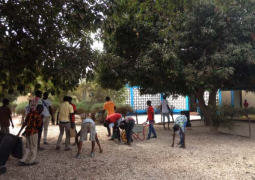A five-day sub-regional seminar ended recently at the Sheraton Hotel in Brufut organised by the ECOWAS Trade Negotiation Capacity Building Project in collaboration with the Ministry of Trade.
In her address at the opening ceremony on behalf of the Minister of Trade, Naffie Barry, permanent secretary at the trade ministry, said the seminar was held to build the capacity of members of the trade policy decision-making committee under the ECOWAS Trade Negotiation Capacity TNCB project.
“It is hoped that the seminar will help not only in meeting The Gambia’s obligation under ECOWAS, but also in formulating and implementing trade policies and programme measures consistent with national and regional development programmes,” she said.
Mrs Barry added that the Ministry of Trade has a key role in helping to mainstream trade into national development policies and strategies.
“In line with this, as you all may recall, our ministry spearheaded the creation of a national committee on mainstreaming trade and trade related issues (MATTRICOM) that could work in this direction,” she says.
Over the years, the committee has successfully organised a lot of activities that have immensely contributed in facilitating trade and the mainstreaming of trade-related issues in national decision-making.
According to Mrs Barry, the impact of continuous capacity building of the committee on trade and related matters is significant and will continue to strengthen the expertise of the committee on addressing issues related to both trade and development that may affect the
It is therefore necessary to enhance trade mainstreaming for market access opportunities for The Gambia. It also needs to be accompanied by a targeted effort to increase capacity to address trade facilitation issues as part of a broader strategy to improve competitiveness, she explains.
The seminar assisted the committee to identify practical ways in which The Gambia could more effectively make use of its right under the Regional Protocol and Trade Agreement and to fulfil its obligations.
The seminar also enhanced the understanding of participants on regionalism to better ensure that national policies and strategies are consistent with regional agreement.
It further enhanced their understanding of issues hindering intra-regional trade - trade often believed to be coming from only international trading partners.
Concluding, she thanked the ECOWAS Commission for providing both the technical and financial support to conduct training seminar.


